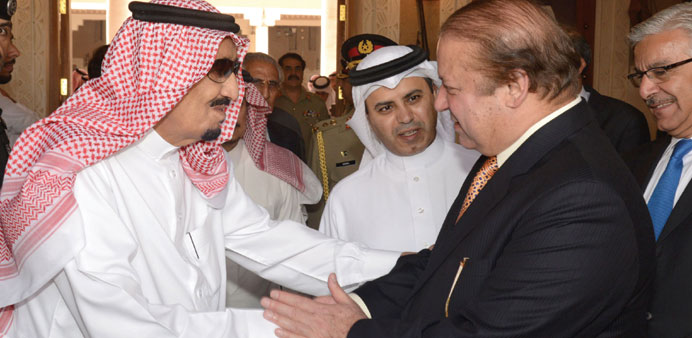Prime Minister Nawaz Sharif being received by Saudi King Salman bin Abdulaziz in Riyadh yesterday.
Agencies/Riyadh
The prime minister of Saudi Arabia’s longstanding ally Pakistan arrived in the kingdom yesterday for talks after his parliament refused to send forces to help a Saudi-led coalition in Yemen.
Nawaz Sharif is travelling with a powerful delegation including Army Chief General Raheel Sharif, Defence Minister Khawaja Asif and other senior officials.
A statement from his office said the one-day trip was to discuss the war in Yemen.
The official Saudi Press Agency said the Pakistanis met King Salman and other top officials including Crown Prince Muqrin bin Abdulaziz al-Saud, Deputy Crown Prince and Interior Minister Mohamed bin Nayef, Defence Minister Prince Mohamed bin Salman and Foreign Minister Prince Saud al-Faisal.
SPA gave no details of their discussions.
A Saudi-led coalition conducted a 27-day campaign of air strikes in Yemen aimed at halting the advance of Iran-backed Shia Houthi rebels and their allies.
On Tuesday night the coalition said it was starting a new phase aiming to resume Yemen’s political process, deliver aid and fight “terrorism,” as air strikes continued.
A Foreign Ministry official said on condition of anonymity: “The delegation will try to reassure the Saudis of support in case of any attack on the country.”
Saudi Arabia asked for troops, jets and warships to be sent, but the Pakistan parliament voted this month to stay neutral in the crisis.
The visit takes place barely a week after the premier sent his younger brother Shahbaz Sharif to Saudi Arabia, but King Salman bin Abdul Aziz refused to meet his delegation, an official said.
Apart from trying to win back the Saudis, Prime Minister Sharif will discuss ways to find a peaceful solution to the Yemen issue, the Foreign Ministry official said.
Pakistan has welcomed the end of air attacks by Saudi-led coalition. “This will pave the way for political solution of the crisis in Yemen,” foreign ministry spokeswoman said on Tuesday.
Nuclear-armed Pakistan has remained ostensibly neutral in the war.
The Houthis, allied with army units loyal to former president Ali Abdullah Saleh, are fighting forces on the side of coalition-backed President Abd-Rabbu Mansour Hadi, whose government has sought refuge in Riyadh.
Pakistan’s parliament earlier this month unanimously voted against complying with Sunni-dominated Saudi Arabia’s request for troops, warplanes and ships. Parliament said Pakistan should instead play a mediating role.
The country has deep military ties with Saudi Arabia and has long benefited from the Sunni oil-rich kingdom’s largesse.
But it has been reluctant to become ensnared in a conflict with sectarian overtones while violence against minority Shias rises at home. Shias comprise about 20 percent of Pakistan’s population.

